What's Libertarian About Gamers?
A look at what there is to learn politically about this now-established subculture

As Reason's June issue attempts to show, video games can't really be classified as an odd little subculture in America anymore. They're as big a form of recreation and entertainment as anything available now, and after four decades, video games have proven they're here to stay.
But obviously, video game consumers have degrees of interest. Just as there's a difference between somebody who buys Miley Cyrus singles on iTunes versus somebody who shells out big bucks to attend her concerts, there's a difference between somebody who plays Candy Crush on a tablet every so often versus somebody who spends a weekend with friends slaying monsters in World of Warcraft.
So we decided to take a look at "gamers," people on the more devoted end of the player spectrum, to see if there were any political trends that were worthy of note. In our two most-recent Reason-Rupe polls, in December and April, we asked how frequently people played video games. Then we looked at the poll responses from those who identified as frequent gamers and compared them to the respondents who never played. Was there anything to learn? What should anybody attempting to court the "gamer vote" know?
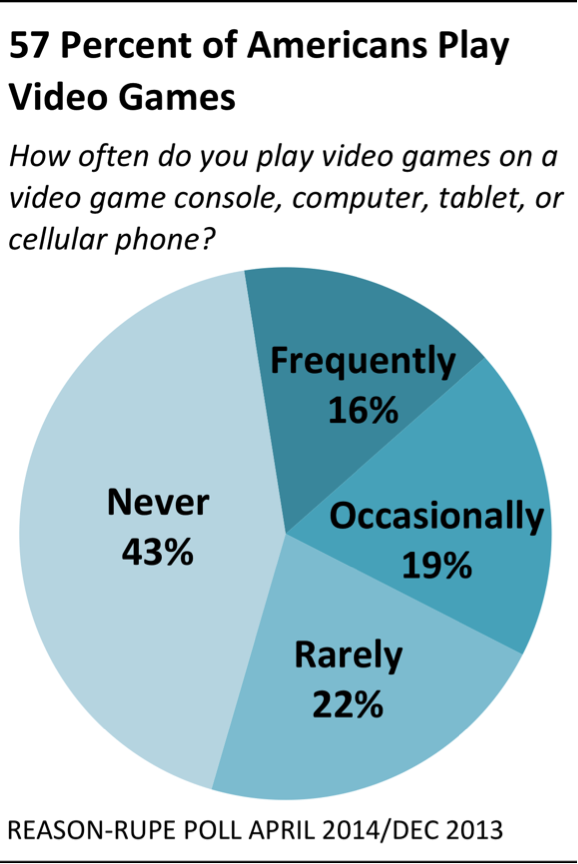
Who Plays?
From our Reason-Rupe polling, 57 percent play games either frequently, occasionally or rarely. We'll be focusing mostly on those who say they play frequently, an average of 16 percent. For those who still operate on the belief the gamers are mostly male, set the sexism aside. The gender split is nearly 50/50, though we did not determine whether women and men liked to play the same kinds of games. Those who believe gaming is a hobby for the young, you're not wrong, but it's not the whole story. While 47 percent of frequent gamers were under the age of 35, nearly one in five gamers were over the age of 55.
Gaming the Parties
Political operatives looking to explore gamers as a voting bloc should know that gamers are more likely to identify themselves as independent than non-gamers and also are less likely to identify as Republicans.
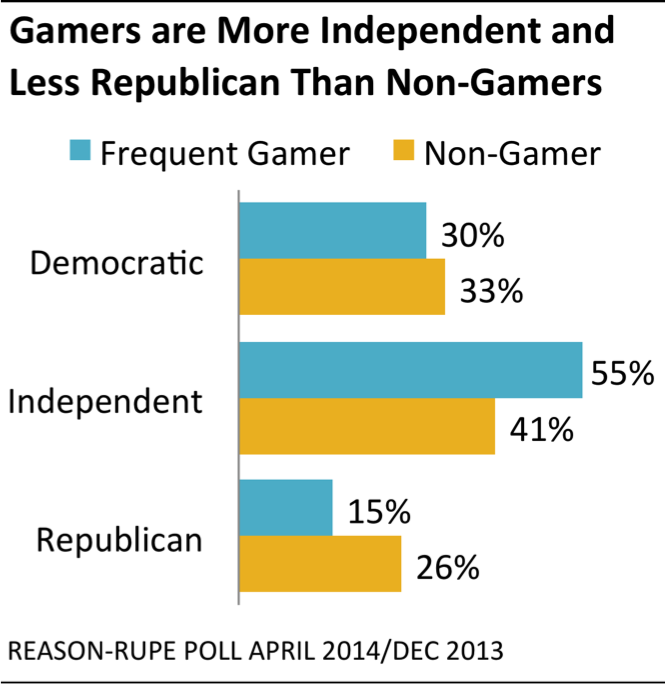
When independent gamers are pushed to identify leanings, they are more likely to lean leftward to the Democrats.
Mapping onto their partisanship, gamers are significantly less conservative and more liberal than those who never play video games. This can't be wholly accounted for by the fact that gamers trend younger. Even within age groups, gamers lean more liberal and less conservative than their non-gaming peers.
But while they may lean more liberal, that doesn't necessarily mean gamers are fans of a centrally planned government to deal with everybody's
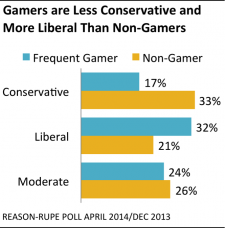
problems. Gamers agree with non-gamers in supporting free market solutions over government intervention when possible, 52 to 43 percent. Gamers also believe (57 percent) that government is often an impediment in people's ability to succeed. And 54 percent disagree with President Barack Obama's views on the role of government.
Don't Tell Me How to Play
If there's any one trend to take away from a poll looking at gamers it's that gamers don't like to be told what to do with their lives. Again, they may describe themselves as liberal, but they do not like government
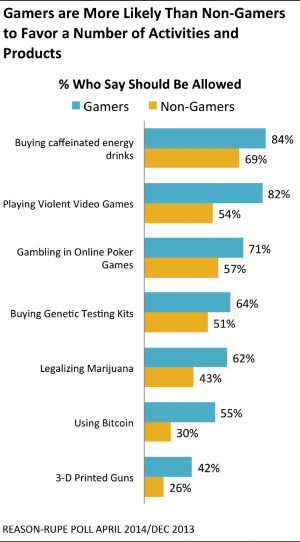
policies that control individual life choices, like what products they can purchase or consume. Video games are all about making choices, right? That's one mentality that does carry over in real life (unlike the fear that games make people more violent). Our polls show that many government bans on products or activities like caffeinated energy drinks or online gambling are already disliked by Americans, regardless of gaming habits. But for gamers, this dislike of nanny-style regulation is enhanced—upgraded if you will. For every single poll question where we asked whether the government should allow people to own, consume, or use certain products or services that are currently a focus of debate, gamers are more likely to say yes than non-gamers. In only one question did gamers support a government ban, for 3D-printed guns. But even then, 42 percent of gamers still supported allowing people to print them, compared to 26 percent of non-gamers.
Probably the biggest gap was the gamer support for allowing use of bitcoin as a currency—55 percent for gamers; 30 percent for non-gamers. This example is particularly interesting because a majority of gamers and non-gamers alike knew very little or nothing at all about bitcoin. But non-gamers appear more likely to call for government regulations or a ban on a product they've never heard of than gamers.
Unsurprisingly, Gamers Love Tech Advancements
If Amazon begins using drones to deliver products someday, gamers think that's an awesome development, far more than non-gamers. The numbers are practically reversed. Gamers love the idea of drone deliveries, 54 to 32 percent. Drone deliveries make some non-gamers nervous. Only 39 percent saw them as a positive development.
Showing that more liberal side mentioned earlier, gamers are more likely to support subsidies for alternative energy subsidies, nearly 20 percentage points higher. Gamers favored subsidies to solar, wind and hydrogen companies, 69 percent to 25 percent. Non-gamers barely reached 50 percent.
Gamers Concerned About Police Power, Accountability
Though gamers may love the idea of having Four Loko and marijuana delivered to them by drones so they can focus on improving their Call of Duty skills, they are much more reluctant than non-gamers to give police the authority to use them and are more concerned than non-gamers about militarization of police (though even non-gamers are concerned about the trend). Seventy percent of gamers think drones and miitary tools in the hands of police goes too far. Only 57 percent of non-gamers agreed.
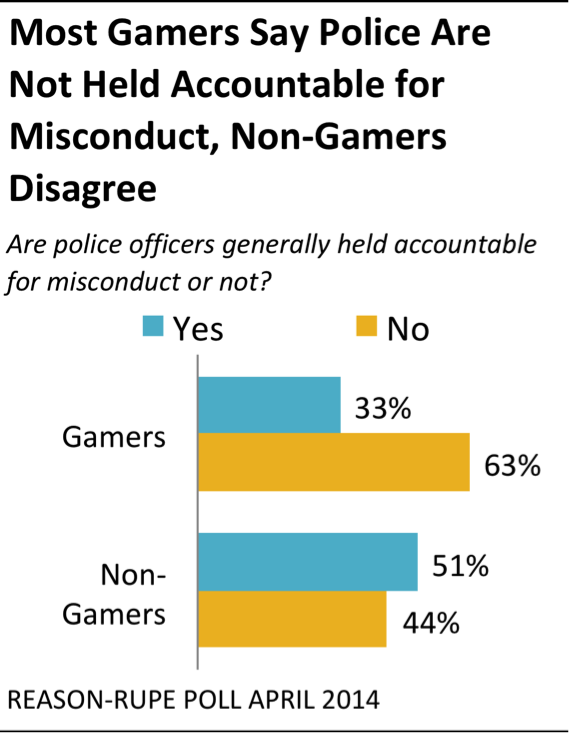
Furthermore gamers are much more likely to believe that police are not held accountable for misconduct. Only 33 percent of gamers think police are punished for misconduct, compared to 51 percent of non-gamers. Though three-quarters of gamers have a positive view of the police, they're much less likely to believe the bad apples are properly disposed of.
Methodological Note
Data on gamers demographics, political affiliations, and views of government come from the combined December 2013 and April 2014 surveys allowing for increased precision. Questions about government allowing or prohibiting various activities and products, and Amazon delivery drones, come from the December 2013 survey. Questions about Bitcoin, alternative energy subsidies, and police abuse come from the April 2014 survey.


Show Comments (55)